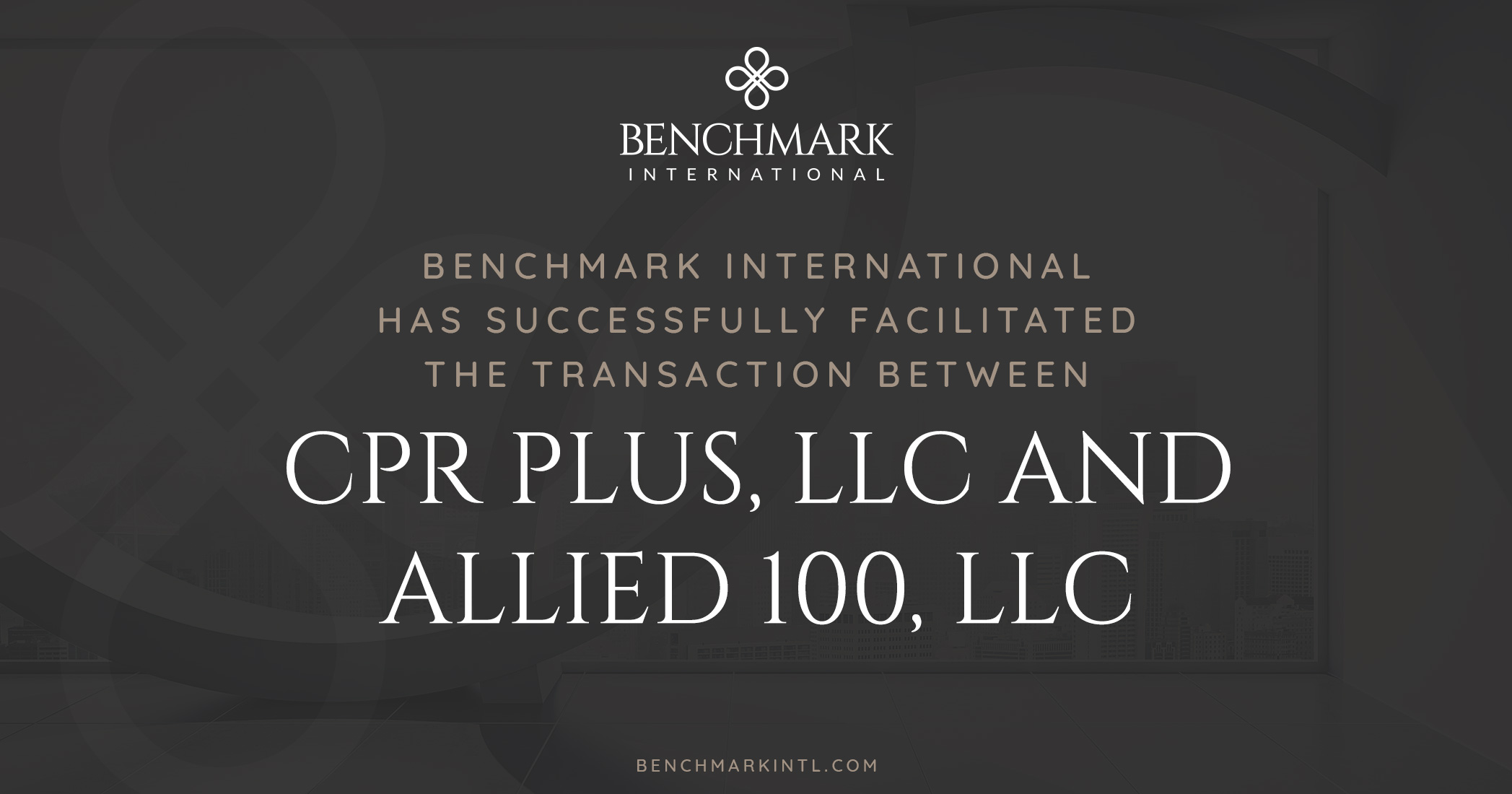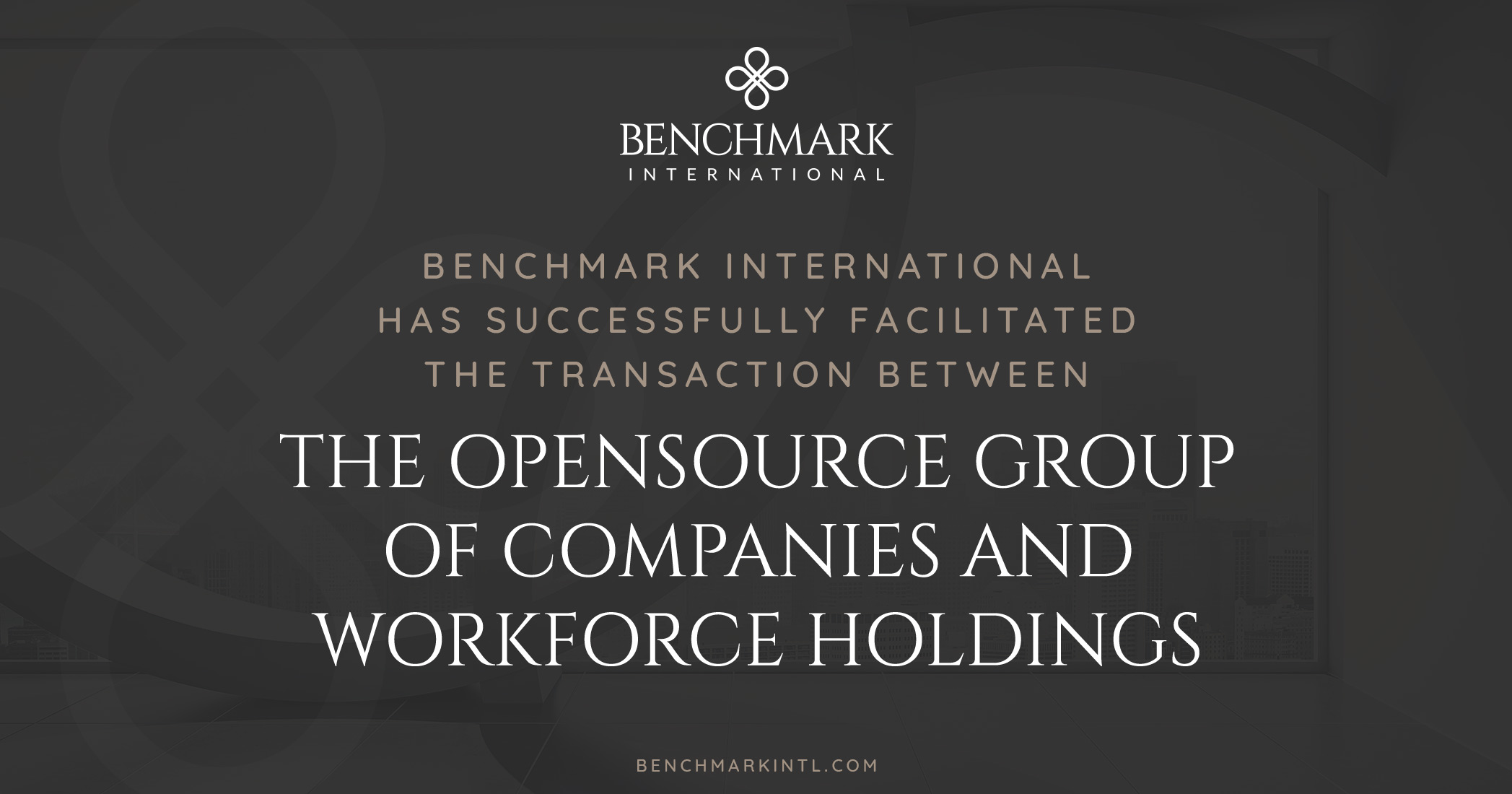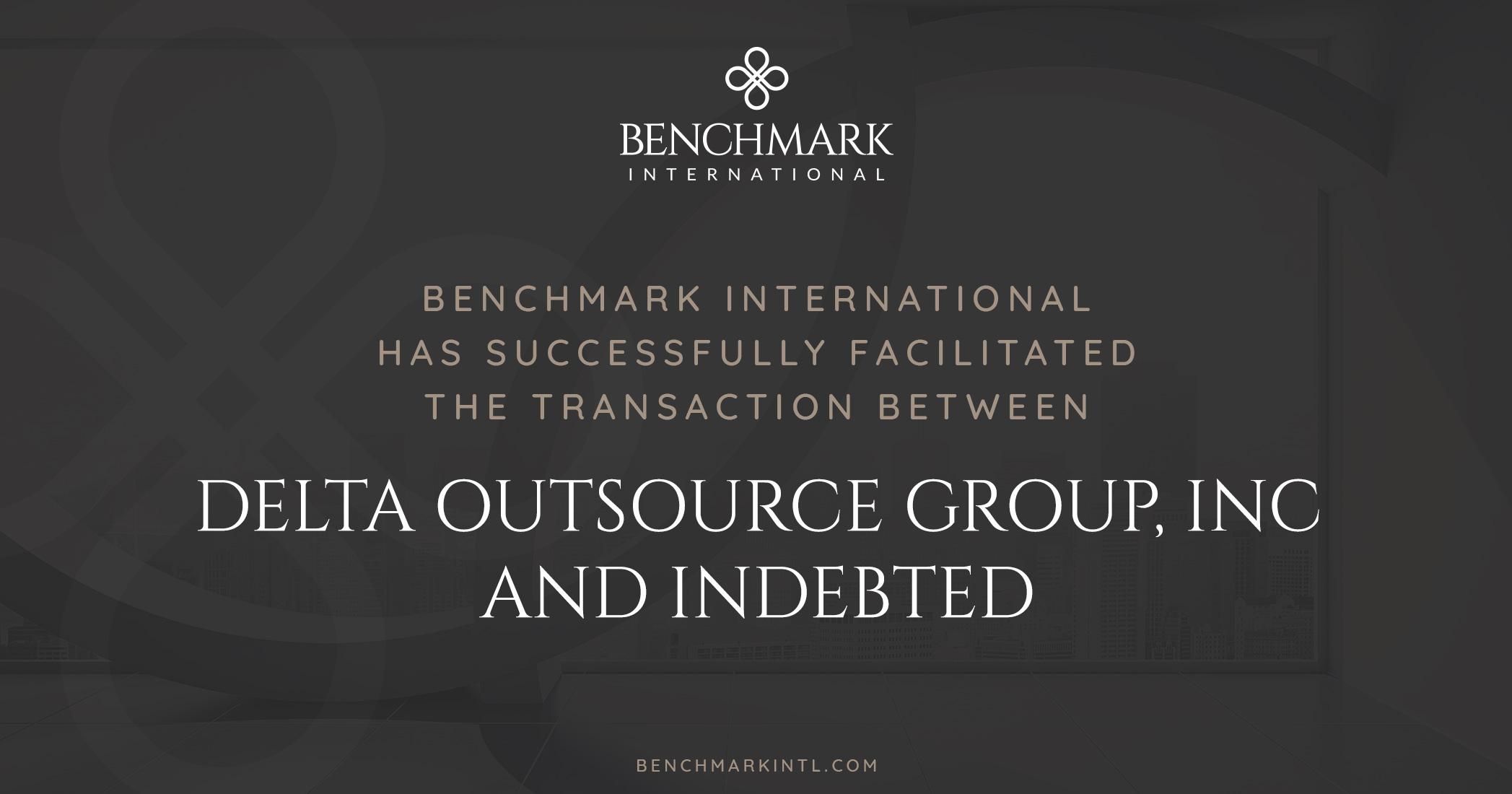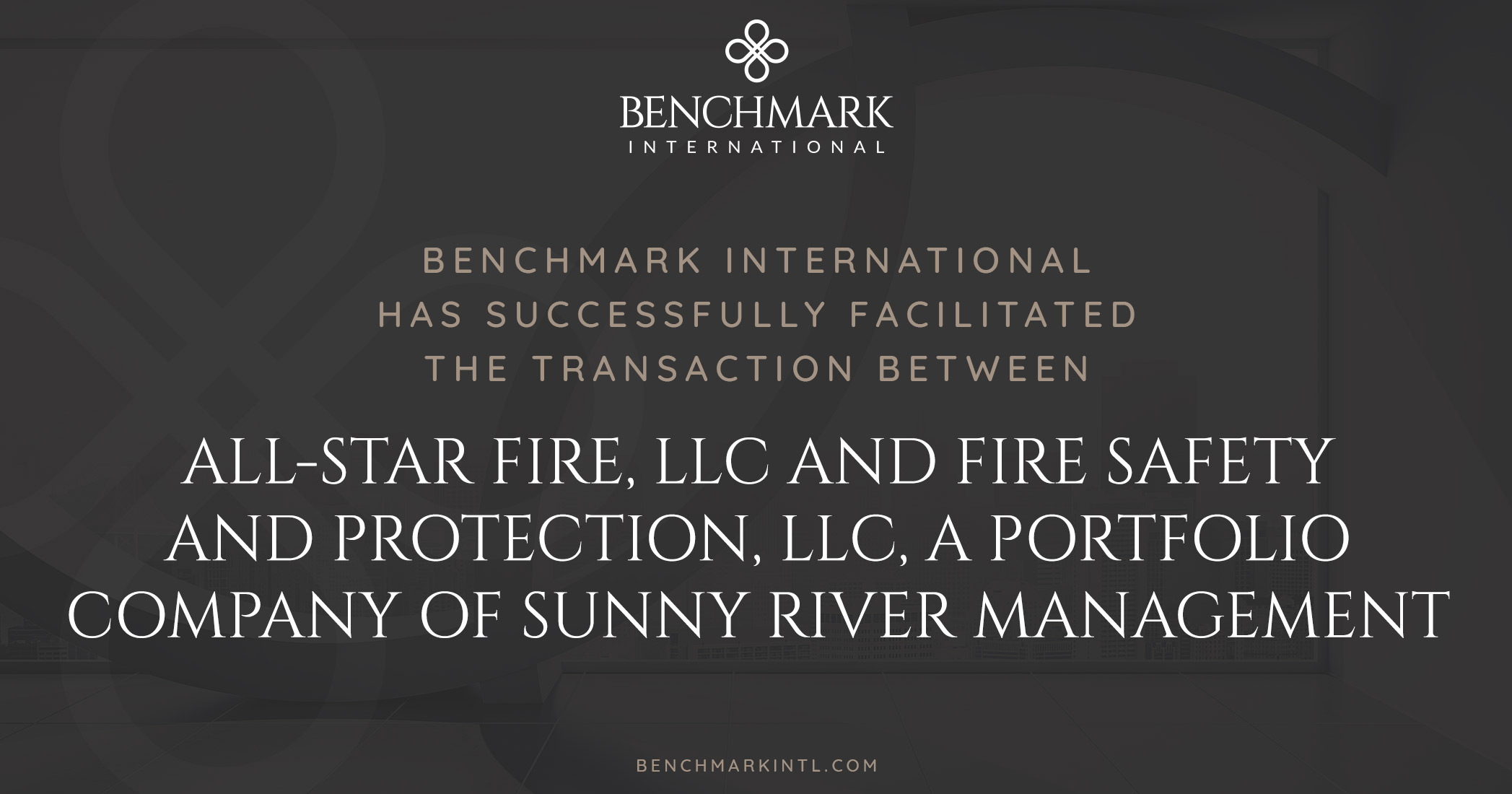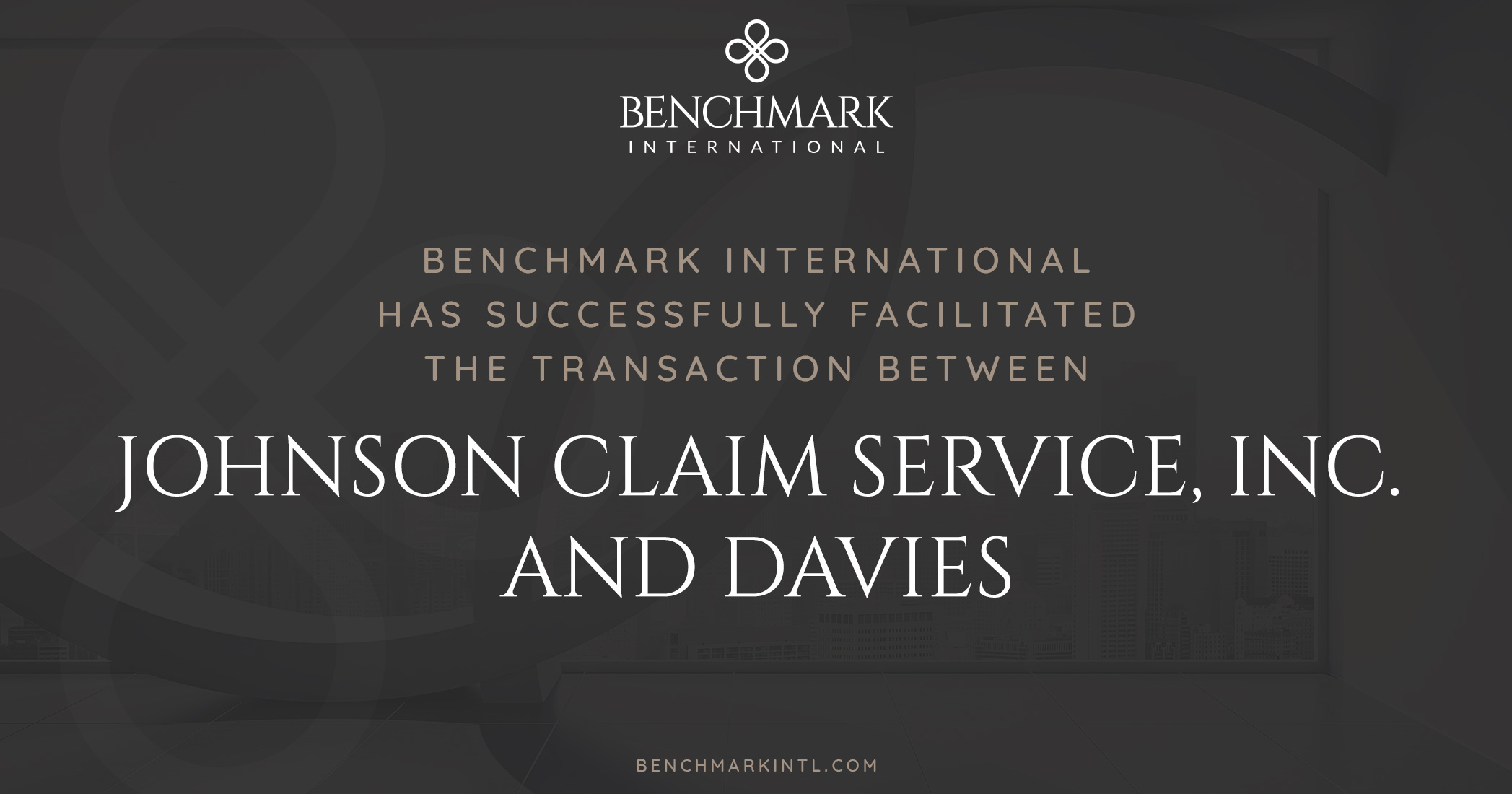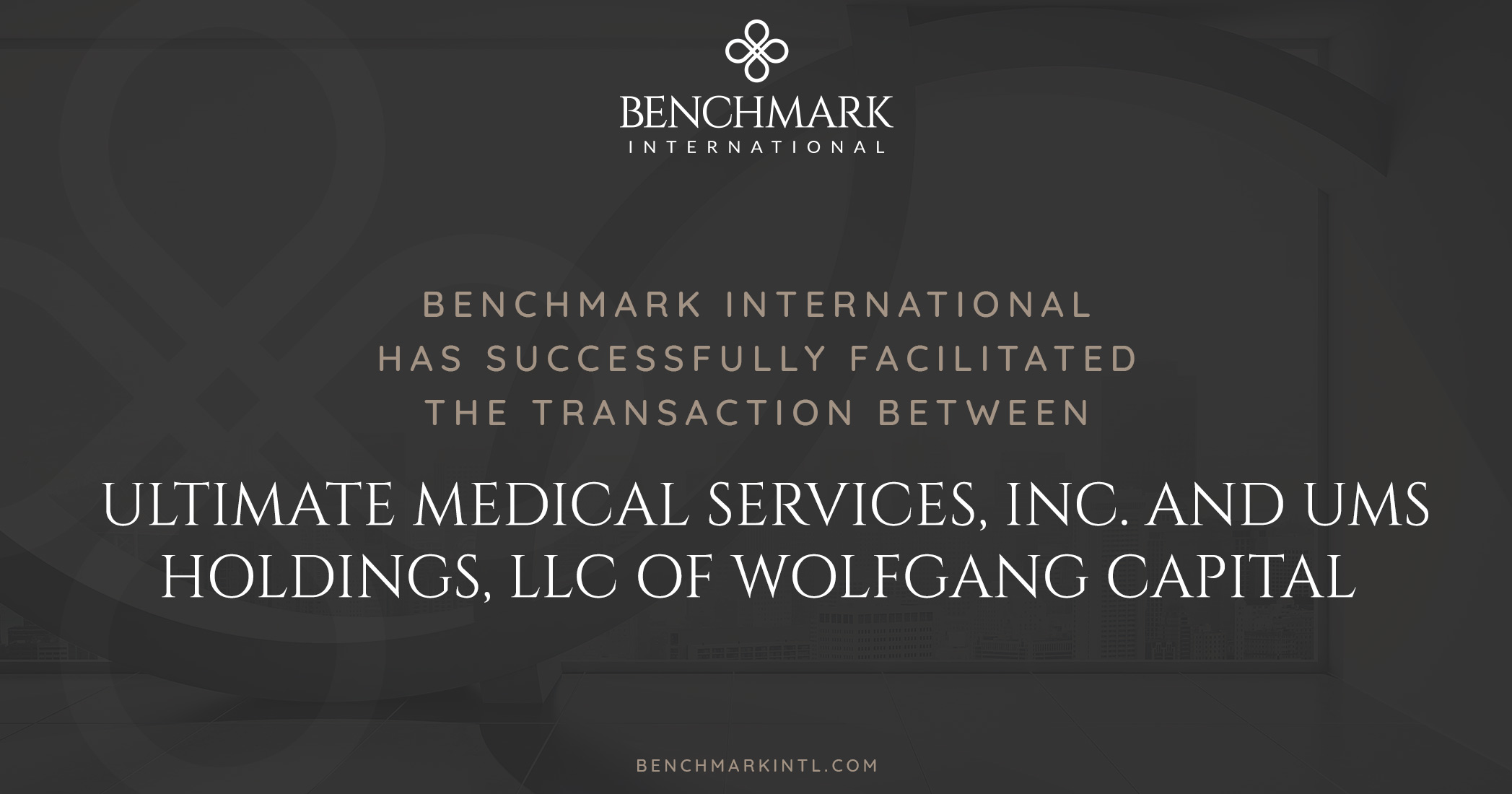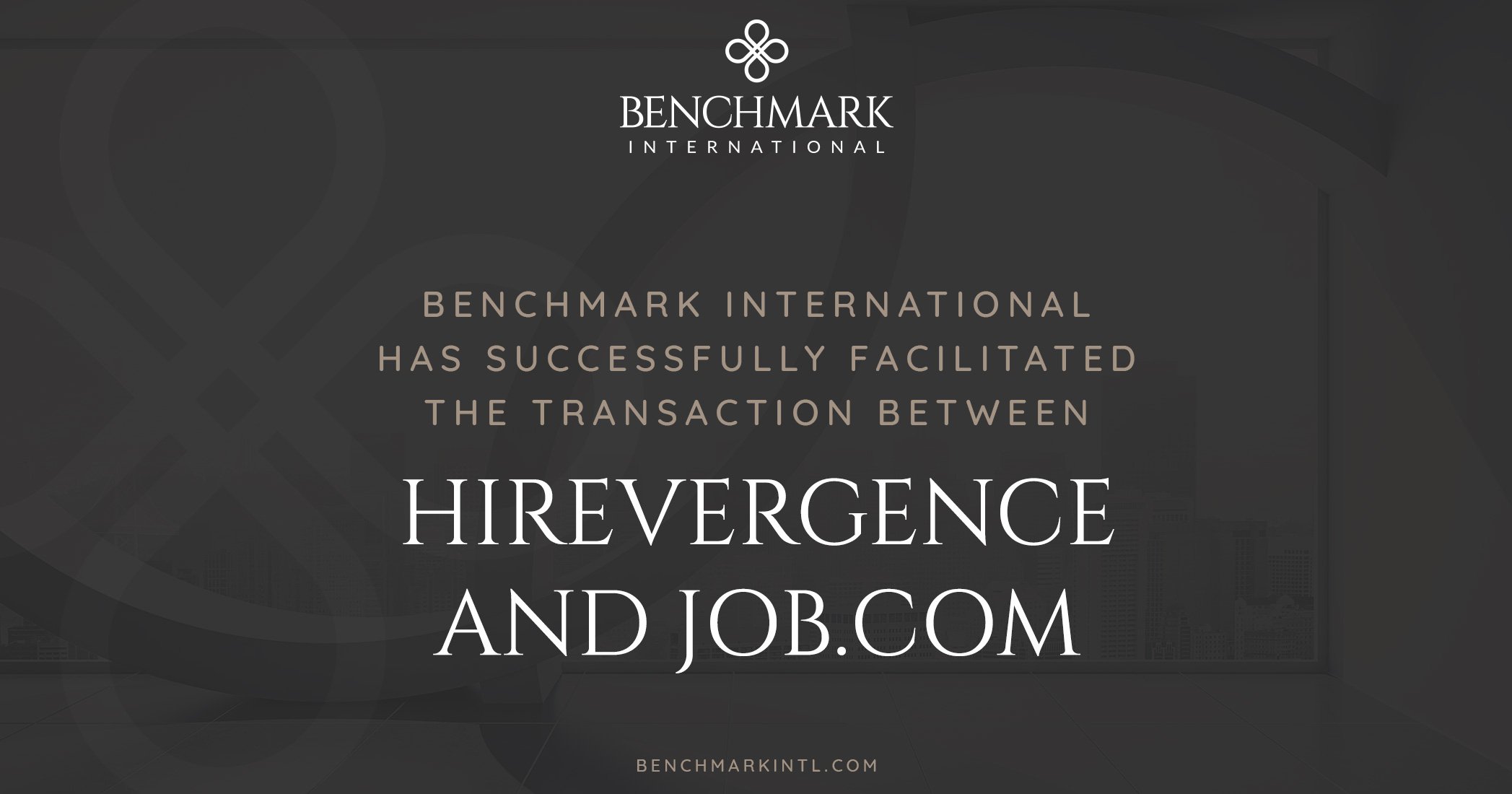On April 30th, 2021, Benchmark International facilitated the sale of CPR Plus, LLC (serving the Greater St. Louis area) to Allied 100, LLC of Madison, WI.
The seller, CPR Plus, provides life-saving skills training to more than 100,000 individuals for close to 30 years in the St. Louis area. Their comprehensive and convenient CPR training courses are accredited by the American Heart Association and administered by friendly instructors with extensive experience.
Archives
Benchmark International Facilitated the Transaction of CPR Plus, LLC to Allied 100, LLC
Benchmark International Named International Mid-Market Corporate Finance Advisory Of The Year
In the GAMECHANGERS (ACQ5) 2021 GLOBAL AWARDS, Benchmark International has been named the International Mid-Market Corporate Finance Advisory of The Year.
The ACQ is a leading corporate news publication serving the sector since 2003, with a global audience of more than 261,000 subscribers. The GAMECHANGERS (ACQ5) GLOBAL AWARDS celebrate achievement, innovation and brilliance, recognizing the most outstanding organizations and professionals in the world.
READ MORE >>Share this:
M&A Expectations After The Covid-19 Pandemic
It’s no surprise that the COVID-19 pandemic slowed M&A deal activity overall in 2020. According to data from PitchBook, more than 2,000 transactions closed for a value of $336.8 billion in Q2 of last year. That represents a 41 percent decline in the number of deals from Q1. Yet, deals did pick up in the second half of the year, which is likely to continue, as businesses are poised for improved economic conditions that leave COVID-19 in the rearview mirror.
READ MORE >>Share this:
The Importance Of Being “Sale Ready”
As a business owner, maybe you haven’t given much thought to selling your company. Or maybe you’ve bounced the idea around but not too seriously. It’s pretty common for business owners to think, “I have years before I plan on selling my business. Why would I worry about that now?” Well, here’s the thing. Life is unpredictable. Just look at how prepared the world was for the COVID-19 pandemic. We think it’s safe to say that no business owner was prepared for that.
But being prepared for the unexpected isn’t the only reason that it is important to have your business in “sale ready” shape at all times, even if you’re not ready to sell. If the company is not in ready condition, it could cost you financially. And it goes beyond that. Always operating your company as if you are ready to sell accomplishes several very beneficial objectives. It ensures that you are operating at peak performance with a focus on profitability at all times, and it helps you avoid being too late to the game to make the necessary changes to be ready to sell. A person’s priorities in life can change quickly or even gradually over a span of years, and you might not have the time to correct any issues that would impact the valuation of your company and, ultimately, its sale price. It’s important to remember that properly preparing a company to go to market can take years. When push comes to shove, if you end up in a situation where you need to sell, not being ready can be a costly mistake.
READ MORE >>Share this:
Benchmark International Facilitated The Transaction Of Nova Engineering And A High Net Worth Individual
NOVA Engineering, Inc. is a State of California Disabled Veteran Business Enterprise (DVBE), a State of California Small Business Enterprise (SBE), a City of San Diego Small Local Business Enterprise (SLBE), and a Service-Disabled Veteran-Owned Small Business (SDVOSB). NOVA Engineering offers the experience of a unique team that brings the enthusiasm and energy of a seasoned firm, tempered by the high level of skill and professional relationships that can only be built through long-term experience. NOVA Engineering provides professional consulting services, including planning, civil engineering, surveying, and stormwater services for San Diego County in California.
NOVA’s team brings extensive experience in providing property, construction, and topographic engineering and surveying services to the San Diego market. They provide responsive, professional service, which has earned them the privilege of working with many clients time and time again.
The high net worth individual that acquired the firm is the principal engineer of two Southern California based consulting firms offering civil engineering, surveying, and planning services. The acquisition of NOVA Engineering allows the acquirer to consolidate the practices to offer a more comprehensive suite of services to the greater San Diego Metropolitan Area.

In reference to the transaction, Danny Barnett, President of NOVA Engineering, explained his experience with Benchmark International, “Benchmark International was a huge help in brokering the sale of our company. From the front end marketing to the back end deal closing, the deal team was constantly in communication about new buyer interest and providing suggestions based on their breadth of deal experience. Most importantly, they were reachable. Every phone call and email we sent was always answered in the same day.”
Sam Stallings, Associate at Benchmark International, stated, “Our client continued to stress the importance of the acquirer’s cultural fit with NOVA Engineering as it was a top priority for our client to be confident that the firm would be left in good hands. Like many business owners within the lower-middle market, NOVA Engineering wanted to ensure that the clients, company, and employees would continue to work with a firm that shares the same vision and values as NOVA Engineering. Our talented deal team quickly sought out a buyer motivated by the client’s footprint and reputation in Southern California. The team’s achievement in identifying a strong cultural fit and seeking an above average multiple for our client is the culmination of tireless teamwork and relentless pursuit of preeminence in the marketplace. We are excited for both parties and wish them the best of luck with their future endeavors.”
Share this:
Understanding Working Capital
Working capital, also referred to as net working capital, is the measure of a company's liquidity, operational efficiency, and short-term financial status. It is the difference between a business’s current assets, its inventory of materials and goods, and its existing liabilities. Net operating working capital is the difference between current assets and non-interest-bearing current liabilities. Typically, they are both calculated similarly, by deducting current liabilities from the current assets. So, essentially, if a business’s current assets total $500,000 and its current liabilities are $100,000, then its working capital is $400,000. But there are a few variations on the calculation formula based on what a financial analyst wants to include or exclude:
READ MORE >>Share this:
Can I Put My Business On The Market Even Though I'm Not Actively Looking To Sell?
Maybe you’re not sure if you are ready to sell your business, but you’re curious about what you could learn if you put it on the market. You can always put your company on the market at any time, but you should understand the right way to do it, and everything that you need to consider.
READ MORE >>Share this:
Can A PPP Loan Help or Hurt My Company Valuation?
The COVID-19 pandemic has impacted businesses of all sizes, affecting the value of many of those businesses. The Coronavirus Aid, Relief, and Economic Security (CARES) Act was created by the U.S. government to get businesses through the pandemic, and includes the Paycheck Protection Program (PPP), which is designed to give private businesses access to cash so that they can continue to pay employees and cover other expenses, such as health insurance, rent/mortgages, and utilities, over a 24-week period. The loans contain provisions for forgiveness as long as the company meets certain requirements and certifications. The PPP loan and its associated forgiveness have impacted how company valuations should be determined for the recipients.
For company valuation purposes, there needs to be an understanding of the reasons that the business got the PPP loan. The loan could indicate that the company has been under duress. Because of this, past financial statements may not accurately represent the future of the business.
READ MORE >>Share this:
Benchmark International Successfully Facilitated the Transaction Between The OpenSource Group of Companies and Workforce Holdings
Benchmark International is pleased to announce the transaction between OpenSource International LTD, OpenSource Intelligent Solutions (Pty) Ltd (OpenSource) and Workforce Holdings Ltd.
OpenSource is a South African and Mauritius-based business that was established in 1993. The company places skilled SAP resources on both a contract and permanent basis as clients utilize SAP’s Enterprise Resource Planning system. The company also provides SAP training and other services, including SAP site maintenance and payroll outsourcing. OpenSource is an accredited SAP partner and resources consultants across all SAP modules and complementary technologies for companies internationally.
Managing Director Michelle Viret has over 35 years of IT experience and specialises in marketing and sales, focusing on resourcing and training. Delighted with the outcome, she commented on the transaction, saying, “Again, thank you for introducing OpenSource to the right company upfront. You heard our brief, and from the first meeting, the long-term choice we made is right for us. Our business fits hand in glove with the Workforce philosophies, operation, and culture – it is certainly a ‘can do’ attitude, and it is refreshing to have input from leaders that have years of business knowledge and savvy, specifically someone like Mr. Ronny Katz.”
Workforce Holdings and its Group of companies provide employment, training, healthcare, wellness, financial services, and lifestyle benefits to individuals and their employers. Established in 1972, Workforce Holdings is listed on the JSE Altx exchange, employing over 1,340 permanent staff and paying approximately 34,000 assignees.
The Group’s business model reflects its diversification and is structured into five operating segments: staffing and recruitment, training and consulting, employee health management, financial and lifestyle products, and process outsourcing. This structure facilitates integration and diversification of services, including expansion into adjacent services and new markets.
Detailing their motives for the acquisition, Workforce stated that this transaction allowed it to further expand its human capital services offering. “This is consistent with Workforce’s previously stated growth and diversification strategy. The acquisition introduces a profitable and specialised business with a broad footprint and a driven, entrepreneurial management team into the Workforce group,” it said.
Ronny Katz, chief executive officer of Workforce, said, “The OpenSource Group offers services as an accredited SAP partner, allowing Workforce to offer leading solutions in a new and diverse market. Also, this complementary offering provides both Workforce and the OpenSource Group with exciting cross-selling opportunities within their respective customer bases.” He added: “Dealing and engaging with Benchmark was a positive experience. The professionalism and pragmatism of their deal team assisted us as buyers in expediting, and ultimately finalize, the transaction.”
Tiaan Smit, representing Benchmark International’s South African office, added, “For the Benchmark International team, understanding Michelle and the unique strengths of the OpenSource business that she has built up over the last 28 years was key to finding the right acquirer. We believe that Workforce is the perfect match, and by leveraging Workforce’s established backing and support, Michelle’s drive, energy, and strategic foresight will take the businesses to even greater heights. We’ll be following their progress closely and look forward to their mutual success.”
READ MORE >>Share this:
Benchmark International Successfully Facilitated the Transaction of Greentex Landscaping, Inc. to Zodega Landscape Services, LLC
Benchmark International is pleased to announce the acquisition of GreenTex Landscaping Inc. by Zodega Landscape Services, LLC.
GreenTex Landscaping Inc. performs landscaping, groundskeeping, edging, trimming, mulch, aeration, and other lawn care services across the North Dallas area, servicing residential and commercial customers. GreenTex has been successfully operating for more than 13 years and has received the Angie’s List Super Service Award for outstanding customer service for six years in a row.
Zodega offers high-quality lawn care and landscaping services to high-end residential and commercial properties across the Houston metropolitan area. In addition to standard landscaping and lawn maintenance, Zodega provides tailored pressure washing and pest control to suit customer needs.
Bill Biancaniello, President of G-Tex, Corp. and former owner of GreenTex Landscaping, commented, “The Benchmark team did a fantastic job of keeping the transaction on track. They were available to provide support throughout the entire transaction process and were particularly supportive in giving the final push which got the transaction over the finish line.”
Regarding the deal completion, Anthony Hernandez, Benchmark International Transaction Director, shared, “the Benchmark team is delighted to announce the successful sale of GreenTex Landscaping to Zodega Landscaping. The team is excited to see Zodega’s successful expansion with the strategic acquisition of GreenTex. It was a particular pleasure for Benchmark International to work with G-Tex and the team wishes each of the parties every success in their future endeavors.”
READ MORE >>Share this:
Benchmark International Successfully Facilitated the Transaction Between Yellow Jersey Logistics and LCS Evolution
Benchmark International is pleased to announce the transaction between Yellow Jersey Logistics (PTY) Ltd and LCS Evolution (Pty) Ltd.
Yellow Jersey Logistics (Pty) Ltd offers niche transport solutions to the clearing and forwarding industry. The company has become entrenched in the industry, forming an integral part of their clients’ service offerings through reliability, speed, and the ability to tailor bespoke solutions. The company’s client base comprises leading freight forwarders and clearing agents, dealing with the import and export of a variety of goods. The company has maintained these relationships through excellent customer service.
The LCS Group (Pty) Ltd is a diversified logistics and end-to-end supply chain solutions business, operating primarily within the bulk mining and materials industry. The Group is driven by an entrepreneurial spirit and a desire for innovation and comprises several companies, including LCS Logistics, LCS Transport Solutions, Bay Shipping, LCS Fuels, LCS Prime Agri, LCS Fleet Support, and LCS Financial Services.
The LCS Group’s Head Office is situated in Heidelberg, Gauteng, with satellite offices/depots in Newcastle, Richards Bay, Durban, Kuruman, Brits, Delmas, Cape Town, Hoopstad & Camperdown.
Reon Britz, the CEO of LCS Group, said: “Yellow Jersey represents a key pillar within LCS’s logistics and supply chain portfolio and will enable the Group to further diversify its offering within the industry as well as positions it strongly for future growth. We would like to thank the Benchmark Intl team and in particular, Johann Haasbroek, for all the assistance in getting this important transaction across the line. We really appreciate all the efforts.”
Commenting on the transaction, Transaction Director Johann Haasbroek with Benchmark International added, “Transactions of this nature are particularly enjoyable when the synergies are self-evident, and the benefit to both entities easily apparent. I am confident that with LCS’s resources brought to bear, an already very successful company will go on to flourish still further in such a group environment.”
READ MORE >>Share this:
Benchmark International Successfully Facilitated the Transaction Between Delta Outsource Group, Inc and Indebted
Benchmark International facilitated the transaction between Delta Outsource Group, Inc and Australian-based InDebted enabling their access into the American market.
The seller, Delta Outsource Group, Inc, has been providing professional and compliant receivables solutions in the U.S. since 2009. The owners of Delta set out to create a collections agency where performance, respect, and communication would put them ahead of the industry’s curve. After accomplishing this, Delta became a viable target.
“While the process was longer than we thought, Benchmark did a good job of advising us of our options and guiding us through the sale process,” said Michael Lages, President & CFO.
The buyer, InDebted, is an Australian-based digital, data-driven collection agency. They have built a collections platform that seeks to empower the financial fitness of their customers.
John Watson, incoming CEO of Delta commented regarding the deal, “After facilitating the introduction of Delta and InDebted and outlining the desired transaction structure, Benchmark did a good job of allowing the principles to work directly with each other to maximize the efficiency of the process.”
Regarding the deal completion, Transaction Director Matthew Kekelis at Benchmark International commented, “The Delta team stuck through a multiple offer situation with many ups and downs along the way. Ultimately, it was a terrific result with both buyer and seller very pleased with the outcome.”
READ MORE >>Share this:
How To Announce An Acquisition
When a company is sold, it can have major effects on employees, customers, clients, and suppliers. Uncertainty stokes fear in most people, as they wonder about their security and their futures. Even top management can feel as though they failed at their jobs when the company is being bought out. For these reasons, it is important that the messaging and transition planning is handled very carefully and thoughtfully leading up to an acquisition—especially considering that the majority of acquisitions fall through. Announcing the news too early can cause widespread unrest over a deal that never happens
Communication is everything in this situation, but it needs to be planned. Before announcing a single word about the sale of the company, you should have a solid plan in place. A consistent message is critical and the distribution of the information should be carefully coordinated both internally and externally to avoid misinformation and confusion. Your plan should clearly outline intentions, steps, timelines and how the process will affect all parties. Predetermine what will be conveyed by whom and when. Figure out how to address questions that you are unable to answer and consider all potential scenarios for all parties involved. And always remember how critical confidentiality is during this time. You do not want details leaking to the press before you are ready to go public.
READ MORE >>Share this:
Why You Should Consider Private Equity
How Private Equity Works
Private equity firms raise financing from institutions and individuals and then invest those funds into the buying and selling of businesses. Once a pre-specified amount is raised, the fund closes to new investors and is liquidated. All of the fund’s businesses are sold within a set timeframe that is typically less than ten years. The more successfully a PE firm’s funds perform, the better its ability to raise money in the future.
PE firms do accept some limitations on their use of investments under fund management contracts, such as the size of any single business investment. Once the money has been committed, investors have nearly zero control over its management, unlike a public company’s board of directors.
The leaders of the companies within a private equity portfolio are not members of the PE firm’s management. Private equity firms control its portfolio companies through representation on the boards of those companies. It is common for a PE firm to ask the CEO and other business leaders in their portfolios to invest personally. This offers a way to ensure their level of commitment and motivation. In return, the operating managers can get significant rewards that are linked to profits when the company is sold.
With large buyouts, PE funds usually charge investors a fee of around 1.5 to 2 percent of assets under management, plus 20 percent of all profits (subject to achieving a minimum rate of return). Fund mostly profit through capital gains on the sale of portfolio companies.
How Private Equity Improves Value
READ MORE >>Share this:
Gamestop, Robinhood, And Drama On Wall Street
The free online trading app known as Robinhood has proclaimed to be “on a mission to democratize finance for all.” It was intended to open up the Wall Street stock market to the average American for investment “on their own terms,” with more easily digestible financial information readily available to novice investors. The app was designed to “let the people trade” and make the financial system more accessible for everyone, until things took quite a turn, all due to a fledgling brick and mortar video game retailer known as GameStop.
The amateur traders using Robinhood became pitted against the hedge fund honchos when they started buying up options and shares of GameStop (GME), enlarging those bets and also making large trades of other stocks, such as AMC Entertainment, Tootsie Roll, and BlackBerry.
How It All Happened
Professional hedge fund investors had been short selling shares of GameStop, essentially borrowing shares of stock to sell, and then buying them back later so they can return them. This lets them profit if the stock price drops (betting that the company will fail). If the stock does not continue to fall, investors are forced to cover their position or buy more stock to minimize their losses.
READ MORE >>Share this:
2021 Is Here. Why You Should Sell Now
As a business owner considering the sale of your company, you may be asking yourself, “When is the right time to sell?” The answer is simple. The time is now.
The global recovery is underway, and 2021 has given us several reasons to be highly optimistic, and these reasons are why you should take action.
READ MORE >>Share this:
Benchmark International Successfully Facilitated the Transaction Between StatKing Consulting, Inc and Genesis Biotechnology Group
Benchmark International facilitated the transaction between StatKing Consulting, Inc and Genesis Biotechnology Group.
The seller, StatKing Consulting, has been providing data related clinical services to the pharmaceutical and medical device industries for over 30 years. StatKing has evolved to become an industry-respected, full-service Contract Research Organization led by two distinguished individuals, Dennis King and Rod Lashley. Both Dennis and Rod have assembled a world-class team of experts to navigate regulatory approval studies.
“Finding the right buyer for the business we had built over the last 30+ years was very important to us. Besides having the expertise to guide us through the steps in selling our business, Benchmark had the resources to connect us with several companies that fit our requirements. Benchmark also provided invaluable guidance as we successfully negotiated a particularly difficult situation enabling us to complete our sale.” – Rod Lashley, EVP StatKing Consulting, Inc.
The buyer, Genesis Biotechnology Group, is a New Jersey based healthcare company providing clinical diagnostics, drug discovery solutions, and manufacturing/distribution of essential laboratory products.
"The way pharma companies work with CROs is changing. CROs are taking more of a strategic planning role and execution in the drug discovery and development process. This engagement model results in sponsors and CROs becoming end-to-end partners, and M&A is helping CRO's extend their service portfolio to partner with their customers in providing greater efficiency in service and delivery across the R&D continuum. The acquisition of STATKING would bring GD3 one more step closer to becoming a full-service CRO," said Ben Bandaru, Ph.D., Director of Corporate Development for GBG.
Regarding the deal completion, Transaction Director Matthew Kekelis at Benchmark International commented, “Benchmark was thrilled to bring StatKing on board as a client. We enjoy working in all industries, but it’s always special working with healthcare companies given our office location in the heart of Nashville’s healthcare hub. Dennis and Rod have built a great company, and I know Genesis will carry on their legacy.”
READ MORE >>Share this:
Why Choose An M&A Firm Over An Industry Expert?
Many business owners believe that enlisting an expert in their industry is the right way to go when selling their companies. But if you want to rake in the most value for your business, there’s a better way.
There is no question that mergers and acquisitions are complicated and subject to constantly changing market conditions and industry trends. An industry expert might know plenty about a particular industry, but they are not experts on selling and buying businesses. A mergers and acquisitions firm is.
READ MORE >>Share this:
M&A As A Strategic Opportunity For Business Owners
It is not uncommon for a company acquisition to be viewed as a simple transaction that means transferring the business from one owner to another. But rather than just allowing the business to simply carry on as is under new leadership, a merger or acquisition should be viewed as a solid strategy to boost the company’s overall health, productivity, and bottom line. While M&A transactions can serve as great solutions for exit strategies, they can be so much more than that. M&A should be regarded as a powerful tactical opportunity.
Often times, M&A deals are considered to be a way to get out and cash out with instant gratification. But what else might be possible when a deal is carefully crafted to deliver sustainable returns and support a powerful legacy for the business in the long-term? M&A done right can translate into great success for a company and, ultimately, its leadership.
READ MORE >>Share this:
2020 M&A In The Global Sports World
In early 2020, there was plenty of optimism for investment opportunities and growth in the sports sector prior to the COVID-19 pandemic, which has since caused disruption in nearly every sector around the world. Financial uncertainty has been a large factor in addition to issues surrounding player contracts and broadcasting rights. Mergers and acquisitions activity in the global sports world has experienced a downward trend but there is hope on the horizon.
Italian Football
Amidst COVID-19 delays, Italian football (calico) has had its share of off-the-field matters this year. In August, the Italian club A.S. Roma announced the completion of a takeover by Texas-based Friedkin Group: an 86.6% stake in for €591 million, a large decrease from the previously agreed upon figure of €750 million prior to the pandemic. This lower price demonstrates how lost matches, sponsorship, and broadcasting income all impact the valuation of sports clubs. In light of these decreasing valuations, PE firms could be motivated to seek out bargain M&A and financing opportunities.
Italy’s Serie A has also embraced private investment. In September, its 20 clubs agreed to create its own media company financed partially by PE funds in order to better organize the sale and promotion of the league's TV rights. The move is designed to improve governance and increase revenue, especially abroad.
READ MORE >>Share this:
Grow Your Business Through A Strategic Alliance Or Strategic Partnership
- Joint Venture: When two or more parent companies form an entity together with a business objective, sharing in the risks and returns, and retaining their individual legal statuses. It can be an equal joint venture, in which both parent companies own an equal portion of the entity, or it can be a majority-owned venture, in which one partner owns a larger percentage of the company. A joint venture can help to save money, combine expertise, or enter new markets. It is not a partnership, consortium, or merger.
- Equity Alliance: When one company purchases a specific percentage of equity in another company.
- Non-Equity Alliance: When two companies enter into a contractual relationship, which allocates resources, capabilities, assets, or other means to one another.
Share this:
Benchmark International Successfully Facilitated the Transaction Between All-Star Fire, LLC and Fire Safety and Protection, LLC, a Portfolio Company of Sunny River Management
Benchmark International is pleased to announce the transaction between All-Star Fire, LLC (“ASF”) and Fire Safety and Protection, LLC (“FSP”), a portfolio company of Sunny River Management (“SRM”).
READ MORE >>Share this:
M&A Outlook Under Biden Election Win
Now that Biden was named the President-elect, what does this mean for mergers and acquisitions under a Biden administration? The good news is that mergers and acquisitions activity is expected to increase regardless of the election results. Many experts predict that M&A activity will return to pre-pandemic levels in the next year, and that the market will be favorable for the next few years.
Taxes
President Biden’s proposed tax plan raises the corporate tax rate from 21% to 28%, which would likely make M&A deals more expensive. Biden has also voiced support for an increase in capital gains taxes, which could impact M&A activity. The proposed plan would tax long-term capital gains and qualified dividends at the ordinary income tax rate of 39.6% on income over $1 million, and eliminates step-up in basis for capital gains taxation. Sellers may be anxious to complete deals prior to 2021 to dodge higher taxes and potentially lower valuations, and to avoid having increased capital gains taxes cut into profits from a deal.
The Biden plan also restores the top individual federal income tax rate from 37% to the pre-Trump rate of 39.6%. It also promotes tax provisions to penalize the exporting of jobs overseas and to incentivize investments in new infrastructure and green energy, transportation and manufacturing, and establishes a minimum tax on corporations with book profits of $100 million or more, structured as a 15% alternative minimum tax, to prevent them from paying no taxes. The plan also offers tax credits to small businesses for adopting workplace retirement savings plans and creates a Manufacturing Communities Tax Credit to reduce the tax liability of businesses that face workforce layoffs or a major government institution closure.
It is important to note that getting tax code changes enacted into law requires congressional leadership and the White House to work together to reach consensus. This can be challenging, and can also take a considerable amount of time, meaning that there may not be immediate tax implications for M&A. But you still may not want to wait until 2021 to sell your company. Here’s why.
Share this:
Benchmark International Successfully Facilitated the Transaction Between Johnson Claim Service, Inc. and Davies
Benchmark International facilitated the transaction of Johnson Claim Service, Inc. in Tulsa, Oklahoma. It has been acquired by Davies.
Johnson Claim Service provides insurance adjuster and appraisal services for insurance contracts written to cover property, casualty transportation and agricultural claims. The transportation claims include truck, trailer, heavy equipment physical damage, motor truck cargo, dealers open lot, garage keeper’s legal liability and non-truck liability. The company has both a domestic and international client base for which its services are provided.
Allen G. Johnson, President of Johnson Claim Service commented regarding the transaction, "We engaged Benchmark to assist in providing professional services in the sale of our insurance related business. Their team, and most importantly their Deal Associate who handled our transaction through to completion, stayed involved during some difficult negotiations. The Deal Associate helped JCS finish the business sale with a very positive result for the owners. Great job Benchmark International!"
Johnson Claim Service will join Davies already established Claims Solutions business in the US, adding specialist transportation claims capability. Globally Davies has more than 4,000 colleagues, with operating centers across the UK, Ireland, Bermuda, the US and Canada. The business delivers professional services and technology solutions across the risk and insurance value chain, including excellence in claims, underwriting, distribution, regulation, customer experience, human capital, digital transformation & change management. This deal marks Davies sixth acquisition of 2020.
Benchmark International proved its value in finding a buyer with experience in the industry through its proprietary multi-medium marketing strategies. In addition, Benchmark International incorporated several campaigns with local, regional and national associations.
Deal Associate Amy Alonso at Benchmark International commented, “Benchmark International added value by negotiating this deal. We saw throughout the entire process that the buyer, Davies, was a perfect fit who stood to benefit greatly from the experience, industry knowledge and high quality service that they would gain from the existing owner. With this knowledge, the team was able to negotiate a deal that would allow for the existing owner to successfully transition the business to a capable buyer. We wish Johnson Claim Service Inc and Davies the best of luck in their future endeavors.”
READ MORE >>Share this:
Enhancing Company Value By Enhancing Culture
Culture Affects the Bottom Line
When a company demonstrates that it’s thriving with happy and motivated talent, it is more likely to garner a higher business valuation when going to market for a merger or acquisition.
There is a proven link between culture, employees, productivity, and profit. Research shows that:
- Businesses with satisfied employeeshave been noted to outperform competitors by 20 percent.
- Happiness leads to a 12 percent boost in productivity and companies with strong cultures see a 43 percent increasein revenue growth.
- When employees are engaged, absenteeism falls 41 percent, productivity rises by 17 percent, and turnover is cut by 24 percent.
Share this:
The Value Of Professional Exit Planning
Exit planning is how business owners prepare to depart from their private company and maximize its value through a merger or acquisition to increase shareholder value or transition the company to serve other objectives. It basically arranges for you to leave your company on your own terms. Unfortunately, many business owners do not recognize the value in professional exit planning because they do not see their company from the perspective of a potential buyer, resulting in significant loss of value when exiting the business.
A solid exit plan clearly defines the business owner’s objectives, and lays out a comprehensive strategy that accounts for all personal, business, financial, legal, and taxation aspects of reaching those objectives, including leadership succession and the future of the business. These objectives include the maximization of value, mitigation of risk, conducting an expedient transaction, and finding the right investor to take over the business in its best interests. The strategy may also cover worst-case scenarios, such as illness or death of the business owner. Quality exit planning usually should take place around 10 years prior to transitioning the business, to allow for value strategies to flourish.
Why It’s So Important
READ MORE >>
Share this:
2020 Financial Services Sector Update
As the world still faces the COVID-19 pandemic, businesses in the financial services sectors are preparing themselves for life after coronavirus. This includes the management of credit risk for borrowers, and turning to digital strategies to drive revenue growth.
Insurance and Innovation
The COVID-19 pandemic is forcing the entire insurance sector to implement and leverage digital platforms that enhance customer experiences as a key part of their business strategies in a transformed world in which people are working remotely and driving their vehicles less often. The pandemic has led insurance companies to implement premium relief efforts, offer payment deferral plans, and expand coverage, but these companies are also turning to more digital strategies, emphasizing online customer experiences at a time when more and more transactions occur online versus in person. Consumers are demanding new products such as cyber insurance, more modern life insurance options, and usage-based car insurance. Middle-market insurance companies have always been a bit technologically behind the big players, but they now must adopt new innovations in order to merely keep up with convenience, simplicity, mobility, and modern interfaces that customers have come to expect.
Banking and Lending
Financial institutions are in a position where they need to understand borrowers’ needs and current financial states more than ever. They must also find new ways to measure performance through the rest of 2020. They have already provided assistance to many small and mid-size businesses during the crisis, some of which will be forgiven. Loan modifications have been provided to help businesses survive, and there is likely to be some loan losses. As the economy begins to recover, banks will be able to get a better understanding of borrowers’ financial states, knowing that it will take some time for businesses to bounce back. Deciding whether to lend more credit will be a difficult decision for financial institutions, especially for harder hit sectors such as hospitality and retail. Understanding the recovery of these industries as a whole will be critical through the use of data and payment activity monitoring.
Family Offices
Family offices are private wealth management firms that serve high-net-worth individuals and their families by offering a total outsourced solution to managing finances and investments. There are nearly 2000 of these types of firms around the world, with more than half in the U.S.
These firms have typically relied on physical offices to conduct business. Now in the wake of COVID-19, a shift to virtual family offices has become a necessity during a time where remote work has become commonplace. This has been a challenge for many family offices because most simply do not have the appropriate technology and infrastructure to result in a seamless transition to a virtual office. These businesses will be forced to evolve technologically into the rest of 2020 and beyond. As outdated technology is replaced with better performing innovations, family offices will become more mobile and agile, as well as better equipped with more adequate cybersecurity. Connectivity is also a timely issue, as Millennials will be inheriting family wealth in the future and they demand immediate access to data without disruption and with more transparency. This digital transformation to virtual family offices will also allow for a leaner staff that can deploy resources more quickly.
Capital Markets
The events of 2020 have led capital markets to affect businesses in different ways. Underwriting slowed for high-yield borrowers. Mergers were put on hold. Stock markets have been up and down, and a record number of securities and their values have been exchanged. As financial conditions improve, confidence combined with cheap credit will have companies seeking liquidity to get through the rest of the crisis. Corporations have been tapping into the public debt markets at high rates. While this generated profits at the start of the recession, bonds are less likely to be issued as businesses restore their reserves and establish liquidity that will be needed into the future.
For the rest of 2020 and into 2021, investment banking associated with M&A activity will continue to be tied to the economic recovery amid a softer deal pipeline. When the economy finally bounces back, there will be opportunity for a backlog of deals, boosting advisory revenues.
Data and Private Equity
In the time of COVID-19, certain private equity trends have emerged and are expected to be here to stay. People are still paramount, but how they work has changed. Data continues to be more important to deal making to determine the areas for greatest earnings impact. Datasets will track strategic movements and metrics within companies to gauge their performance. Remote workforces will allow competitive PE firms to source key financial talent from entirely new geographic regions. Firms are also expected to outsource more of their back-office work functions and instead focus on front-office responsibilities.
Ready to Sell?
If you are a business owner who is considering making a move, our M&A experts at Benchmark International would love to discuss how we can help with the sale, exit or growth of your company.
READ MORE >>Share this:
Key Steps For Expanding Your Business Into New Markets
As globalization becomes more common in our world, many businesses are choosing to take advantage of the growth opportunities that lie in expanding into new markets. But expansion can be a significant undertaking for small and middle-market businesses, with many moving parts. As a business owner, you need to fully assess and understand the risks and rewards that expansion can present for your company. The following steps outline areas on which you should focus, and which elements of your business you should have ready in order for an effective expansion into new markets.
Impact Assessment
Before expanding your company into new markets, you must have a comprehensive understanding of what the overall impact on your business will be. Conduct market segmentation and product gap analyses to assess whether your product or service will sell in the target market and do a SWOT analysis to see how it stacks up against local competitors. You need to know if there is a need for your company and if anyone will buy what you are selling. You will also need to consider how large the market is and how long it may take to reach your target sales numbers.
READ MORE >>Share this:
Life Sciences And Biotech M&A During Covid-19
The COVID-19 pandemic has created an urgent demand for testing, treatments and a vaccine from life sciences and biotech companies. It has also changed the deal-making landscape in this sector. Advances in genetic sequencing have led to the development of new immunotherapies and approaches to medicine that has lowered risk and boosted M&A value and volume.
Over the past five years, biotechnology M&A activity has generated hundreds of completed deals and hundreds of billions of dollars in aggregate value. Leveraged buyouts accounted for one fifth of all acquisitions completed in three of the past four years. The compound annual growth rate of the biotech market is 7.4 percent, on pace to reach $727.1 billion by 2025. There are currently upward of 100 experimental COVID-19 treatments and vaccines in development, including 11 being studied in clinical trials.
The life sciences sector is the key to a solution for COVID-19, from testing improvements to vaccine candidates. In April, Moderna Therapeutics was given $500 million from the U.S. Department of Health and Human Services to accelerate development of its mRNA vaccine. Over the past ten years, public and private sector researchers across biotech have collaborated to greatly reduce the lag time between genetic sequencing of a virus and running human trials. With academia partnering with governments to speed up development, it is expected to be positive for the long-term strength of the sector.
READ MORE >>Share this:
Guide To A Healthy & Wealthy Retirement
You have worked so hard to build your business and when retirement is finally on the horizon, it is a very exciting time. But it can also come with many questions. These tips will help you navigate the ins and outs of retirement so that you can live your best life.
Keep Making Plans
Just because you are approaching retirement, it doesn’t mean you are retiring from life. Keep planning for your future. Consider five-year plans and goals. Think about taking college classes or acquiring new skills you have always dreamed about. Getting another degree, learning something like playing an instrument, or learning a new language can be great ways to keep your juices flowing and open up new opportunities in life.
Explore the Best Places to Retire
The world is brimming with amazing places to consider for your retirement years. Maybe you are perfectly content staying where you are. But have you even thought about the possibilities? Check out our article about some of the greatest places to retire…and be inspired.
Have a Solid Financial Plan
This includes investment options, taxes, and more. There are many ways to invest, such as mutual funds, stocks, bonds, real estate, dividends, CDs, annuities, and exchange-traded funds. Additionally, having an exit plan can ensure that your future is protected. Prior to exiting your company, mergers and acquisitions strategies can help you grow your business and maximize its value for a sale, laying the groundwork for worry-free retirement wealth. Experienced M&A advisors can help you make the most of this. You will also need to consider how much you will need to pay in taxes after you retire. This is something you will definitely want to get right. Some estimates suggest that for each 1% error in effective tax rate, you face an 8% error in your final savings balance.
Stay Structured
Maintaining a routine can be a major game changer for keeping your sanity in retirement. You no longer need to go to the office. So what do you do? It is easy to find yourself meandering and not knowing what to do with yourself. That’s why it’s important that you stay busy and have some sort of structure to your everyday life now that you are no longer on the clock. Engaging in activities such as volunteering, gardening, and exercising can keep you healthy, happy and regimented.
Maintain a Youthful Perspective
They say age is just a number. And there are actually studies that support how mental attitude can improve overall health and even reverse the effects of aging. Thinking young can actually help keep you feeling and functioning as young. It helps to stay inquisitive, continue to develop and improve yourself and expand your horizons. Falling into a rut after retiring can be detrimental to your state of mind and your physical health. It can also be very helpful to maintain social relationship with younger people to keep up with changing perspectives, get inspired, and hear about more than gripes regarding the aches, pains, and medications associated with aging.
Map Out Your Legacy
In addition to the impact you will be leaving on the world through your professional endeavors, you will want to make plans for your estate to determine what you wish to leave for your heirs. This is when a financial planner can be of great help. You will need to think about estate taxes, appropriate inheritances, and the roles of your family if they will be taking over your business.
Consider Catch-Up Contributions
You already know that there is a limit to how much you can save in your IRAs or 401(k)s. But did you know that once you reach the age of 50 in the U.S., the IRS allows you to make additional catch up contributions that are beyond annual contribution limits? It’s a way to make it easier for savers over the age of 50 to boost their retirement savings.
Understand How to Protect Yourself from Fraud
Fraudsters are known to target people over the age of 60, especially in today’s digital society. Stay educated on what scammers are up to and know how to discern between what may be real and what may be fake regarding emails, texts, phone calls, and the physical mail. A good rule of thumb is to remember that if it sounds to good to be true it probably is. Also, unsolicited offers can be common traps. Other things you can do include not answering robocalls, not clicking on pop-up ads or email attachments, being skeptical of free offers, and not paying up front for promises.
Think Long Term
Today’s life expectancy rates are much higher than they used to be just decades ago. You should plan your retirement with a long future ahead. This is not only good for your mental wellbeing, but also important for your financial future. Consider that your savings will need to last longer. Your healthcare costs may be higher. Search for retirement calculators online to help you get a better picture of what your needs will be.
Get a Dog
The many benefits of having a dog to health and wellness are well documented. Dog owners have been proven to enjoy lower blood pressure and stress factors, and need fewer doctor visits than those without pets. Having a dog can also help to keep you active and engaged with other people. Plus, all that unconditional love releases beneficial hormonal chemicals such as serotonin and oxytocin that are proven to fight depression and make you feel good.
Ready to Retire?
Contact our M&A experts at Benchmark International to start the conversation about selling your company, planning your exit strategy, and getting on the road to a prosperous retirement.
READ MORE >>Share this:
Middle Market M&A Valuation Gaps And Expectations
Many factors can impact middle-market M&A deal making, but one of the most significant issues that can affect closing is a valuation gap between the seller and buyer. This tends to be more common during a seller’s market because business owners with successful companies are inclined to wait for the best offer, versus a buyer’s market that occurs when there are fewer buyers, which motivates sellers to jump at an offer. Unrealistic expectations about valuation multiples often stem from the comparison of a mega deal to a middle market deal—a situation under which the same multiples are typically not going to apply.
There is also often a disparity between what a seller needs to maintain their retirement lifestyle and what value can be extracted at the time of the sale. There may be differences between a buyer’s offer, what they pay, and what the seller ultimately receives, as taxes are always a factor in a transaction. Additionally, the timing of the deal and the perception of risk regarding future growth and earnings flow for the business can play a major role in the size of the valuation gap. Selling a business is a highly complex process and it comes with great emotional implications for a seller. Emotional ties coupled with overt optimism can easily cloud one’s vision when it comes to the actual value. As a business owner, you put in a great deal of work starting your company and building it into what it is today. In contrast, selling that business is completely unchartered territory for most owners. When you are looking to sell, you need to be realistic regarding the company’s current value and its growth rate, and what the buyer will be getting out of their investment. Buyers are not going to recognize the hard work you put into starting the business in the same light that you do. All that work you did in the beginning is not on their radar—they are going to be focused on their returns.
Valuation gaps also result when private equity firms and strategic buyers compete for quality investments and relatively inexpensive financing is available. This can be both good and bad for middle-market business owners. Significant buyer interest creates considerable competition for quality deals, which is great. But at the same time, if the market is hot and demand is high, unrealistic valuation expectations and skewed perspectives can result in a valuation gap.
This is why a thorough evaluation of a business is so crucial to the M&A process. A good M&A advisor will take meticulous steps to best determine an accurate current business enterprise value, while also managing the seller’s expectations of a valuation range before going to market. So, if you are a business owner, and you plan to approach buyers without professional M&A representation, you need to understand company valuation gaps, your intrinsic risks as a seller, and how to bridge these gaps. This can require a great deal of education on your part and can be very time consuming. Or you can simply enlist professional M&A advisory expertise and have the peace of mind that the fate or your business is in the best possible hands. The best advisors will work diligently on your behalf to help you attain your goals for your business and your financial future. It requires a team with proven experience, resources, and best practices to successfully navigate the many legal, accounting, due diligence, and marketing considerations involved in arriving at an accurate and realistic company valuation and getting a quality deal done.
Engage Our Expertise
Our top-notch M&A analysts at Benchmark International can help you with your company, from creating growth strategies to selling it for maximum value. Set up a time to talk with us and we can determine what solutions are best for you and your business.
READ MORE >>Share this:
Benchmark International Successfully Facilitated the Transaction Between Ultimate Medical Services, Inc. and UMS Holdings, LLC of WolfGang Capital
Benchmark International is pleased to announce the cross-border acquisition of Ultimate Medical Services, Inc. by UMS Holdings, LLC of the Wolfgang Capital group.
Ultimate Medical Services, Inc. is a provider of diagnostic medical imaging equipment and maintenance services for the South, Central United States market. Medical imaging equipment includes digital radiography, computerized radiography, X-rays, Ultrasound, MRI and CT. The company is a full-line imaging company that provides services for preventative imaging products as well as routine studies and emergency procedures.
Wolfgang Capital LLP purchases, develops, and manages businesses with revenues of £1 to £20 million. UK-based Wolfgang Capital is a solution-focused business committed to generating growth through acquisition.
Kevin Fix, former owner and CEO of Ultimate Medical Services, Inc. said “Benchmark International stood with us through every step of the transaction process and we were impressed by their desire to search the globe to find a buyer. Their efforts ultimately paid off and they facilitated the close of our company with a buyer based in the United Kingdom. The Benchmark team placed a lot of emphasis on being able to help get a deal done in any condition, even despite the global Covid-19 quarantines and the subsequent economic crisis. The team’s persistence proved especially valuable in overcoming numerous obstacles ranging from having multiple potential buyers initially fall through to eventually juggling a complicated cross-border transaction to reach a successful close. Maxim Belov was particularly hands-on and helpful through every step of the sales process.”
Regarding the deal completion, Anthony Hernandez, Benchmark International Transaction Director, stated “the Benchmark Team is delighted to announce not just another successful closing, but to also announce the first transaction we have had the pleasure of facilitating in Louisiana, with several more surely following on its coattails. Senior Analyst Maxim Belov did an excellent job liaising between the parties to facilitate another cross-border transaction for the Benchmark International team.”
READ MORE >>Share this:
2020 Apparel, Beauty & Home Furnishings Sector Update
The COVID-19 pandemic has brought about disruptions for businesses operating in the fashion, beauty and home furnishing sectors. This is because of complicated global supply chains and reliance on discretionary spending by consumers amid record unemployment levels. Keeping these types of businesses adaptive is crucial to their recovery and long-term success.
Supply Chain Disruption
“Nearshoring” is a term that describes the relocation of the production of goods so that they are moved geographically closer to consumer-dense regions such as the U.S. and Europe. This has been an attractive option for fashion and home furnishings companies, yet the cost of displacing established supply chains and vendor relationships have prevented them from making the move. But the landscape could be changing due to COVID-19, geopolitical turmoil, and antiquated supply chain practices.
READ MORE >>Share this:
2020 Business And Professional Services Sector Update
Business and professional services (BPS) firms are facing increased uncertainty amid the COVID-19 global pandemic. This climate is resulting in less investment and more reliance on revolving credit to maintain access to cash for operating expenses, and keeping priorities on payroll and workforce decisions. Companies with strong liquidity will shift to growth strategies and digital transformation. Also, with a greater need for mobility in a more remote-working world, there is a greater emphasis on cybersecurity, especially for government contractors and law firms.
Government Contracting: A Hot Market for Acquisitions
Government contracting is a significant moneymaker, especially in the United States. These firms rely on the needs of the government and the availability of financial resources for public investments. Government spending is often used to stimulate the economy during a slump. Through the first two quarters of 2020, government spending held steady, with health spending peaking along with the COVID-19 response, with billions going to national interest agencies and programs related to the pandemic.
The middle market in government contracting is comprised of several small, technically specialized service providers that offer high growth opportunities for larger companies that are seeking more capabilities and specific contract access. The pandemic slowed deal flow in the first half of 2020, but deals still happened with transactions expected to continue in the second half of the year. Private equity firms are seeking stable streams of cash flow and government contractors are relatively insulated from recession, making them a solid target for strategic investment and bolt-on acquisitions. M&A activity in the government contracting space is forecast to continue into 2021 as the sector (with the exception of aerospace) has been less impacted by the coronavirus and there is a need for more consolidation in the market.
Cybersecurity is paramount for government contractors for obvious national security reasons. In July of 2020, the U.S. Department of Defense issued the Cybersecurity Maturity Model Certification (CMMC) to build upon cybersecurity best practices from established industry standards with the goal of reducing cyber-risk among its contractors. Other departments of the government will likely do the same, prompting contractors to prepare for it in advance.
The big commercial tech companies typically draw the top tech and cybersecurity talent, making it challenging for government and its contractors to attract talent and offer competitive salaries. During times of increased unemployment due to a pandemic, many skilled workers are seeking out less risky positions. Government contractors should jump on this opportunity to attract young, tech savvy talent.
Law Firms: Challenges and Opportunities
Due to the pandemic, law firms have had to deal with furloughs, layoffs, pay cuts and reducing expenses while finding new ways to boost revenues while working remotely. Liquidity equals agility in uncertain times, so firms should seek to expand their credit lines while making the most of government assistance options.
Human capital remains the single biggest asset for law firms. Working remotely has brought about new challenges for attorneys and staff as they juggle the demands of working, parenting and caregiving. Investing in programs, technology, and other ways to support staff is more important than ever. Amid cutbacks and a lack of contact with colleagues, talent needs to know they are still valued and connected to the firm’s success. Firms also need to take this time to assess what lessons have been learned from remote working regarding obstacles, delays and infrastructure needs and how they can address needs, especially in regard to digital support.
Security and privacy are major issues for law firms operating remotely as they need their files and records to be accessible from outside the office. A digital security strategy is key even once the pandemic has passed, as no one knows for sure what the new normal will look like. Once security is implemented and established, focus can shift to maintaining client relationships and creating revenue growth into the future. Investment in mentoring programs and empowerment of staff can help grow the business and identify new opportunities to support the firm once the pandemic is over and the economy is ready to bounce back.
Contact Us
If you are thinking about a merger or acquisition for your business, please reach out to our M&A dream team at Benchmark International to discuss how we can help you accomplish great things.
READ MORE >>Share this:
The Impact Of 5G On M&A
Next-generation 5G networks are widely viewed as one of the most impactful and anticipated technological developments in current times. With super-high speeds of 100 times faster than that of 4G networks, 5G is expected to bring broadband connectivity to 10 times the wireless devices and usher society into a digital industrial revolution that will open up new possibilities, innovative applications, reduced energy consumption, and economic growth.
The Impact of the 5G Value Chain on the Global Economy for 2020-2035
- Up to $13.2 trillion of goods and services through 2035
- $2.1 trillion in GDP growth
- 22.3 million new jobs
*According to a study commissioned by Qualcomm Technologies, Inc.
When Will 5G Finally Be Available?
READ MORE >>
Share this:
Should You Consider Cross-border M&A?
The world economy’s appetite for cross-border mergers and acquisitions continues to grow in popularity amid globalization and the emergence of new technologies. These types of global deals offer their fair share of risks and rewards. So how do you know if it’s the right strategy for your company? While there is no magical equation to answer that question, you can take the time to understand what you will be faced with in a cross-border transaction, how it may make sense for your particular business within your sector, and what precautions you will need to take.
Motivations for Cross-Border M&A
There are several different reasons that business leaders turn to cross-border deals to address their needs and benefit their companies. These objectives include:
READ MORE >>Share this:
Benchmark International Successfully Facilitated the Transaction Between HireVergence LLC and Job.com
Benchmark International has successfully facilitated the transaction between HireVergence LLC and Job.com.
HireVergence, based in Tampa, Florida, is a highly specialized staffing firm providing experienced cybersecurity and IT resources to clients of all sizes nationwide. The founders of HireVergence, Mark Tuszynski, Dave Gilden, and Julio Sanchez, bring more than 50 years of combined experience in information technology.
Job.com is a digital recruitment company with a unique perspective: delivering technology and capabilities that shake up the market by bringing together a data-driven approach based in AI and machine learning with high-level human capital delivered solutions, designed to efficiently attract and retain the right talent and provide consumer-level user experiences throughout the hiring process.
According to the company’s announcement, “We're delighted with the acquisition of HireVergence, their fantastic team, and to work with their loyal customer base. This is a major step towards Job.com's vision of a digitized staffing industry, delivering a hiring experience to the jobseeker that moves away from transactions and focuses on career journeys," says Arran Stewart, co-founder, and Chief Visionary Officer.
"We are excited to be joining forces with Job.com. Our shared vision of leveraging technology to reshape the recruitment industry will provide immense value for our customers and exciting opportunities for our team. The three of us are looking forward to continuing on the journey we started nine years ago with Job.com," says HireVergence founders Mark, Dave, and Julio.
Regarding the transaction process, Dave Gilden commented, “As founders, we were very pleased with the pipeline of qualified buyers that Benchmark was able to produce. We had multiple options to choose from, each with a unique upside to consider. Ultimately, it is highly unlikely we would have found any of these opportunities on our own.”
Senior Transaction Associate Sunny Yang Garten at Benchmark International commented, “It was a pleasure to represent HireVergence in this strategic transaction. Dave, Mark, and Julio are engaging and always responsive to diligence requests. We’re excited to see that their legacy will be preserved and enhanced through this transaction with Job.com. On behalf of Benchmark International, we wish both companies continued success.”
READ MORE >>Share this:
2020 Industrials Sector Update
The industrials sector has had to adapt to significant disruption due to the global COVID-19 pandemic, and the challenges associated with it. While 2020 started on a very positive note with rapid growth for the global manufacturing sector, manufacturing output plummeted throughout the beginning of the year and into May due to shutdowns around the world. Output, new orders, exports, and purchases all fell to levels not seen since the 2008 recession. Many large manufacturing countries were under lockdowns into April, but restrictions were eased in May, which helped deter the overall rate of decline. In the wake of the crisis, many companies have found ways to evolve and use digital solutions to transform their business models, discovering changes that will continue to be beneficial in a post-COVID world. This adaptability is crucial to the survival and future relevance of these businesses.
Industry Highlights
- Automation and connective worker technologies have become even more important to boosting productivity.
- Migration to the cloud allows companies to be more flexible in dealing with disruptions.
- The auto manufacturing industry is growing more resilient due to greater supply chain visibility.
- For oil and gas companies, advanced digital technologies are a vital investment.
The Fourth Industrial Revolution
Industrial companies that made prior investments in digital technologies and IT infrastructure were able to operate efficiently during the earliest phases of the pandemic. The Fourth Industrial Revolution, also known as Industry 4.0, has enabled manufacturers to evolve their traditional supply chains and processes into highly interconnected systems. Leading organizations have been investing heavily in developed digital platforms specific to the industrials sector, pivoting business models towards being more software-centric. Additionally, smart manufacturing technologies are now transforming traditional manufacturing processes and paving the way into the future. More and more companies will be exploring digital technologies to enhance their flexibility and operate more innovatively. Robotics and 3D printing are among the most popular operational solutions that are expected to see continued heavy investment.
While remote work has become a relatively easy and normal option for many employees across different sectors, the industrial manufacturing sector is not one of them simply for logistics reasons. For example, machines need operators to keep them running. However, it has been demonstrated that technology can help limit the number of people needed to maintain operations.
Connected worker technologies are helping to streamline and hasten solutions. Typically, machine repairs require operators to contact service technicians, sometimes located in different facilities or at the original equipment manufacturer. Also, training new or existing workers has typically been face to face. Augmented reality is helping to eliminate in-person interaction for the purposed of repair, service and training and empowering workers to be more independent through digital on-demand access to manuals, instructions, and other resources.
While manufacturing companies tend to be more hesitant about migrating operations to the cloud, these organizations are realizing that cloud technologies enables them to move inventory, work smarter, customize products, and shift resources in much more flexible manner. The cloud is also an effective asset-performance tool that gives supervisors a remote window into facilities, production lines, and individuals.
Robotics and automation have significantly increased productivity for manufacturing processes. By replacing manual processes with automated alternatives, it helps to mitigate workforce availability challenges and reduces the impact of low-cost labor decisions.
Additive manufacturing and 3D printing continues to evolve and has shifted from the production of prototype applications to finished products. These manufacturing technologies are gaining more traction and offer efficient value chain solutions that enable on-demand production, less working capital, reduced supply chain complexity, fewer tools or parts needed, and less frequent human intervention.
The Auto Industry
Technology and connectivity is now the third most cited investment priority for the
automotive manufacturing industry. The future lies in edge computing, monitoring software, and the Industrial Internet of Things. Companies are able to collect and analyze data on site and in real time, connect applications to essential equipment, and conduct advanced monitoring and remote controls.
Another result of the pandemic for the auto industry is a need for more transparency in global supply chains. Thanks to AI, there is a shift from existing models in equipping automakers so that suppliers can use analytics to respond to changes in real time. For middle-market companies that have been known to underinvest in tech, this shift is especially important. Investment in IT infrastructure will help establish a more nimble and scalable environment, and will create more valuable data. The sequentially distributed databases of Blockchain technology are also changing supply chain management and adoption is expected to increase greatly into the future.
The Oil and Gas Sector
Digital technologies are also being adopted by oil and gas companies in order to bolster cost and operational efficiencies, improve safety, and reduce environmental impacts.
Robotics, AI, cloud solutions and Blockchain are all being used more and more to advance the industry. According to Bloomberg, oil companies are expected to spend $1.3 billion on advanced analytics alone in 2021. The big oil and field services companies with more experience aggressively adopting innovation and that are in favorable cash positions are more likely to continue investing in new tech. Human intervention is being scaled back. Maintenance procedures are being automated. Drones are being used to monitor real-time conditions and detect leaks. AI sensors are monitoring conditions such as temperature and vibration. At the same time, small and mid-size companies that were less mature coming into the pandemic are likely to focus spending on technology that helps them keep their businesses running.
Contact Us
No matter what sector your business operates within, Benchmark International is here to help. Contact us to discuss how we can help you grow or sell your business for maximum value.
READ MORE >>Share this:
2020 Real Estate Sector Update
The real estate industry, both commercial and residential, is undergoing transformation due to the effects of the COVID-19 pandemic. People are working from home, traveling less, and some are migrating to smaller cities. Digitalization is becoming more prevalent, as owners, developers and managers of properties are seeking out virtual and touchless solutions to ensure safety and boost efficiency in a competitive market. Middle-market companies that keep up with the demand for innovation are poised to thrive under these new-normal conditions.
Real Estate Trends Expected to Continue
- Office spaces are being reconfigured to offer more space for each worker.
- Remote work is facilitating home purchases farther away from large cities that are home to corporate headquarters.
- Virtual touring experiences are becoming standard for home sales.
- Hotels are adapting to new measures to ensure guest safety.
- Retail properties are being used for other commercial uses.
- Leasing arrangements are becoming more creative to improve liquidity and cash flow.
- The inability to have in-person property experiences are hampering due diligence efforts.
- The construction sector will continue to employ virtual tools such as 3-D modeling and site management platforms.
Remote Working and the New Office
As millions of office workers have been working remotely to help avoid spreading the COVID-19 virus, employers were somewhat surprised to see that workers were more productive while working from home. Analyses show that average workdays increased in hours and big tech companies announced that remote working would continue into the long-term future. A result of this is that companies are:
- Looking to reduce the cost of office space.
- Providing more space per worker for any necessary in-person collaboration.
- Using video conferencing setups in small team rooms to bridge home and office work.
- Implementing thermal scanners, improved ventilation, UV light for cleaning and other safety measures.
Property owners and managers of office spaces have been able to continue to collect rent payments during the pandemic. However, as unemployment rises and the economy remains uncertain, it could impact the financial markets, making property and mortgage payments more difficult. Additionally, pension fund managers for large unions often invest in office markets due to their stable rents and cash flows, but if tenants cannot pay rent, pension payments may be cut.
Residential Real Estate
Residential home buying is also changing due to the coronavirus. Prior to the pandemic, Millennials were already willing to sacrifice job opportunities to buy homes in secondary cities in search of affordable housing. A study by Redfin showed that more than 50 percent of workers in major tech hub cities would move elsewhere if their company offered a remote work option, with the desire to live someplace less expensive. New tech advancements in a more remote-work-driven world are enabling these workers to pursue both dreams. Major tech companies are recognizing the cost burden that comes with maintaining sweeping campuses in major metro areas and are leading the way in the trend to shift to remote working as more professional services companies follow suit.
How homes are being purchased is also changing. Online home shopping by Millennials was already on the rise before the pandemic, causing realtors to adapt their selling processes. Virtual reality tours and 3D floor plans are becoming standard practice. Appraisers are using drones for exterior photography. Paperwork is reduced and replaced by electronic filing and signing.
Retail Real Estate
Retail property owners have many tenants that have been forced to close due to COVID-19 restrictions and many of these tenants are refusing or unable to pay rent while closed, forcing landlords to devise workarounds and, in turn, struggle to pay their own bills. Retailers were already struggling pre-pandemic due to increasing e-commerce popularity. Now landlords are providing rent abatement periods, rent waivers, flexible payments, and interest-free repayment in order to aid in their tenants' survival.
Hospitality Real Estate
The pandemic has limited non-essential travel, as business travelers are working from home and many leisure travelers are choosing to stay home for safety reasons. The hospitality sector has taken a massive hit under these circumstances amid changing restrictions and stay-at-home orders. As economic loss negatively impacts the hospitality industry, operational priorities are shifting from personal guest experiences to the safety of guests. Economy lodging is being less affected than larger, upscale hotels because essential construction workers are still traveling to job sites in smaller markets while large conferences are cancelled and professional group business travel is being limited. Investments in new technologies by hotel operators are also crucial to the hospitality real estate industry as extensive safety measures are needed. Typical in-person processes are being replaced by digital options. Common areas are being reassessed to offer social distancing. New cleaning and ventilation measures are being implemented. These changes are expected to aid in the economic recovery in this sector.
Construction
A new era of technology is playing a major role in the construction industry. Enhanced safety protocols are being implemented in existing commercial buildings. Construction companies are embracing new technologies in the development and management of new projects. Prefabrication and modular buildings, as well as virtual construction methods, are seeing accelerated growth amid the new circumstances due to the pandemic. A recent survey showed that construction executives foresee double-digit
increases in single-trade and multi-trade prefabrication assemblies, as well as permanent modular construction, over the next few years. These construction techniques offer better project schedule performance, lower construction costs, and improved construction quality.
Considering M&A?
No matter what sector your business operates within, our M&A experts at Benchmark International are eager to discuss your future with you, whether it’s selling your business, growing your company, or devising your exit or succession plan.
READ MORE >>
Share this:
Overview Of Steps In The M&A Process
The processes behind mergers and acquisitions can be quite complicated. Each deal is unique and has its own level of intricacies. However, all M&A transactions tend to follow a basic framework of steps. Most M&A advisory firms follow this basic framework, but bring their own methodologies to the table. This outline will give you a rudimentary view of the process.
What Are The Steps In The M&A Process?
1. Target List Creation
In order to engage in the selling or buying of a business, you must have potential buyers or sellers. Suitable M&A targets can include competitors, vendors, or customers. This is also a good time to consider how much geographical factors should be taken into account.
2. Contact Initiated
Once the target list is established, contact is made and discussions begin to gauge the interest level of the buyer or seller.
3. Sending of a Teaser
A teaser is a document that sellers send to buyers. It supplies just enough information to entice the buyer into wanting to know more. It showcases topline info such as the company’s product or services, its unique selling points, industry overview, ownership structure, potential areas of growth, and high-level financials.
4. Confidentiality Agreement Signing
This ensures that all sides in the deal agree to keep all discussions and materials confidential.
5. Sending of the Confidential Information Memorandum (CIM)
The CIM serves is drafted by the sell-side of a transaction and serves as a type of handbook. It provides all the information a buyer needs to ascertain whether they want to make an offer, such as company management, operations details, financial data, future projections, customer diversification, market opportunities, competition, and other relevant specifics.
6. Submissions of Indication of Interest (IOI)
Upon their review of the CIM, the buyer then expresses interest in moving forward by submitting a non-binding written offer. An IOI typically provides a valuation range for the sale price, transaction structure, timeframe, and other important details. It limits the buyer’s time and financial resources devoted to the deal if the proposal falls short of expectations and other bids. For the seller, an IOI helps them to measure the market appetite for the company, compare different buyers’ views on value, and perform preliminary due diligence on the buyer’s ability to complete the transaction.
7. Management Meetings
After the initial communications that establish interest on both sides, it is time for the buyer and seller to meet and take the conversation further. Both sides take this time to learn more about each other to get a better idea of compatibility and whether it is a good fit.
8. The Letter of Intent (LOI)
The buyer submits a detailed document with a price and deal structure that details items such as closing dates and conditions, an exclusivity period, any break-up fees, management compensation, escrow, and so on. These are usually non-binding, but they can be denoted as binding.
9. Formal Due Diligence Process
This important phase is when all documentation and records are compiled by the seller and provided to the buyer. The findings help the buyer assess their risk and improve the decision-making process. Due diligence examines an extensive level of information on the company, including all financials, intellectual property, customer base, management, talent, synergy, outstanding litigation, technology, infrastructure, stockholder issues, production, inventory, supply chains, real estate, marketing plans, and anything else that is relevant to the business.
10. The Purchase Agreement
A Purchase Agreement supersedes any previous IOI and LOI. This binding document lays out the final terms of the deal including the purchase price, a detailed list of definitions used in the agreement, timeframes for the delivery of final statements, executive provisions, representations, warranties, schedules, indemnifications, closing conditions, and break-up fees.
11. Pre-Closing Period
Sometimes there is a pre-closing period during which the seller and buyer prepare all deliverables and fulfill closing conditions such as government approvals and third-party consents. The duration of this period can vary depending on the closing conditions.
12. Closing
Once all of the closing conditions are met, the transaction is ready to close. Funds are exchanged and the buyer assumes possession of the business.
13. Post-Closing Period
After the deal closes, there are usually post-closing financial adjustments and integration topics to be addressed between the seller and buyer.
Ready to Make a Deal?
Our M&A experts at Benchmark International would love to hear from you regarding your company and its potential. Our world-renowned team offers the unparalleled transaction experience, remarkable resources, and global connections that you need in your corner to in order to get the most value possible out of your M&A deal. Learn more about our unique Benchmark Fingerprint Process here.
READ MORE >> Benchmark International
Benchmark International  Benchmark International
Benchmark International 
